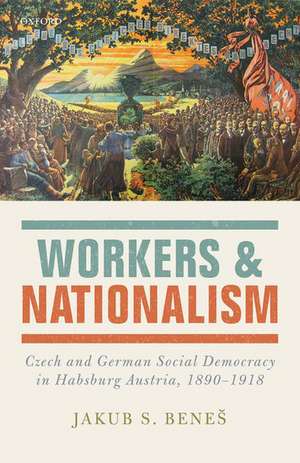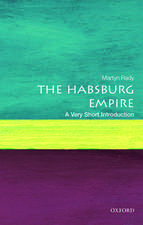Workers and Nationalism: Czech and German Social Democracy in Habsburg Austria, 1890-1918
Autor Jakub S. Benešen Limba Engleză Hardback – 8 dec 2016
Preț: 593.31 lei
Preț vechi: 850.52 lei
-30% Nou
Puncte Express: 890
Preț estimativ în valută:
113.53€ • 123.82$ • 95.73£
113.53€ • 123.82$ • 95.73£
Carte tipărită la comandă
Livrare economică 14-19 aprilie
Preluare comenzi: 021 569.72.76
Specificații
ISBN-13: 9780198789291
ISBN-10: 0198789297
Pagini: 286
Ilustrații: 15 black and white images, 2 maps
Dimensiuni: 164 x 235 x 21 mm
Greutate: 0.56 kg
Editura: OUP OXFORD
Colecția OUP Oxford
Locul publicării:Oxford, United Kingdom
ISBN-10: 0198789297
Pagini: 286
Ilustrații: 15 black and white images, 2 maps
Dimensiuni: 164 x 235 x 21 mm
Greutate: 0.56 kg
Editura: OUP OXFORD
Colecția OUP Oxford
Locul publicării:Oxford, United Kingdom
Recenzii
This is an original work, exquisitely researched, exceptionally well informed by the secondary literature in a number of different fields, and engagingly written...a creative and provocative work of scholarly conceptualization that certainly marks a significant step forward in the discussion.
[T]his superb volume by Benes takes a decidedly bottom-up approach to Austria, providing a fascinating account of the emergence of Czech and German socialism, a topic bizarrely neglected in English-language scholarship....Highly recommended.
Beneš's...research is highly illuminating.
Deeply researched and clearly written, this book is a major contribution to the literature on nationalism in modem Central and Eastern Europe.
Workers and Nationalism is a much needed original intervention that will compel scholars to see the Austrian Social Democrats — both Germans and Czechs — at the centre of nationalizing post-1890 Austrian politics.
Beneš' monograph is as important to our understanding of the Central European labour movement as it is to a reassessment of the nationality question in the Habsburg Empire. He presents us with a very welcome challenge to simplistic accounts of nationalism in the region. More studies of this kind are needed.
[A] well-researched and richly-annotated monograph
[an] innovative study ... Workers and Nationalism provides captivating insights into the influence of nationalism on late Habsburg working-class culture.
an important book
This compelling study, which began as a dissertation in history at the University of California, Davis, explores how industrial workers in imperial Austria came to embrace nationalist forms of politics in the decades before the Great War... Rooted in an impressive array of archival materials, this book brims with telling popular texts, all translated into clear and colloquial English. Benes is to be congratulated for his original and significant contribution to the historical literature.
From start to finish, Beneš demonstrates a nuanced and dispassionate appreciation for how asymmetries between the German and Czech national movements played out among socialists of both tongues ... Rooted in an impressive array of archival materials, this book brims with telling popular texts, all translated into clear and colloquial English. Beneš is to be congratulated for his original and significant contribution to the historical literature.
[Beneš] directs our attention, rather, to the grass roots, where a transnational, socialist movement fighting exclusion from political society on class grounds gradually switched focus, once the vote had been won, to a struggle against exclusion on the grounds of national minority status. In the process, social democracy split along ethnic lines, because neither side understood the concerns of the other. As Beneš insists and illustrates, with copious and vivid evidence from Czech and German memoirs, newspapers, pamphlets and popular literature, this distinctly working-class variant of nationalism was, by the time of the First World War, a mass movement; the opinions of party leaders were irrelevant.
[an] inspiring study ... Beneš highlights the autonomy of ordinary workers to form their own views on nationhood, class relations, and political means and aspirations. He does so by analyzing a rich collection of sources, ranging from proletarian prose and poetry to speeches, essays, diaries, and memoirs of rank and file workers and party activists.
[T]his superb volume by Benes takes a decidedly bottom-up approach to Austria, providing a fascinating account of the emergence of Czech and German socialism, a topic bizarrely neglected in English-language scholarship....Highly recommended.
Beneš's...research is highly illuminating.
Deeply researched and clearly written, this book is a major contribution to the literature on nationalism in modem Central and Eastern Europe.
Workers and Nationalism is a much needed original intervention that will compel scholars to see the Austrian Social Democrats — both Germans and Czechs — at the centre of nationalizing post-1890 Austrian politics.
Beneš' monograph is as important to our understanding of the Central European labour movement as it is to a reassessment of the nationality question in the Habsburg Empire. He presents us with a very welcome challenge to simplistic accounts of nationalism in the region. More studies of this kind are needed.
[A] well-researched and richly-annotated monograph
[an] innovative study ... Workers and Nationalism provides captivating insights into the influence of nationalism on late Habsburg working-class culture.
an important book
This compelling study, which began as a dissertation in history at the University of California, Davis, explores how industrial workers in imperial Austria came to embrace nationalist forms of politics in the decades before the Great War... Rooted in an impressive array of archival materials, this book brims with telling popular texts, all translated into clear and colloquial English. Benes is to be congratulated for his original and significant contribution to the historical literature.
From start to finish, Beneš demonstrates a nuanced and dispassionate appreciation for how asymmetries between the German and Czech national movements played out among socialists of both tongues ... Rooted in an impressive array of archival materials, this book brims with telling popular texts, all translated into clear and colloquial English. Beneš is to be congratulated for his original and significant contribution to the historical literature.
[Beneš] directs our attention, rather, to the grass roots, where a transnational, socialist movement fighting exclusion from political society on class grounds gradually switched focus, once the vote had been won, to a struggle against exclusion on the grounds of national minority status. In the process, social democracy split along ethnic lines, because neither side understood the concerns of the other. As Beneš insists and illustrates, with copious and vivid evidence from Czech and German memoirs, newspapers, pamphlets and popular literature, this distinctly working-class variant of nationalism was, by the time of the First World War, a mass movement; the opinions of party leaders were irrelevant.
[an] inspiring study ... Beneš highlights the autonomy of ordinary workers to form their own views on nationhood, class relations, and political means and aspirations. He does so by analyzing a rich collection of sources, ranging from proletarian prose and poetry to speeches, essays, diaries, and memoirs of rank and file workers and party activists.
Notă biografică
Jakub Beneš was born in Berkeley, California to Czech and Slovak parents, one of whom was raised in America. He took his bachelor's degree at Middlebury College, Vermont before returning to California and completing his doctorate under the supervision of Professor William Hagen at UC Davis. Since 2012 he has lived and worked in the UK, first as postdoctoral fellow at the University of Birmingham, and most recently at Oxford. Beneš's scholarly interests are focused on modern central and eastern Europe, particularly on the history of nationalism, social movements, and popular culture. His next project looks at rural unrest during the collapse of Austria-Hungary.















